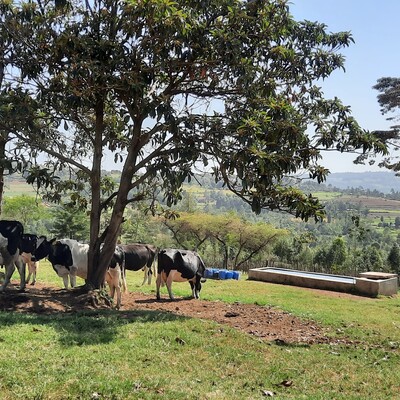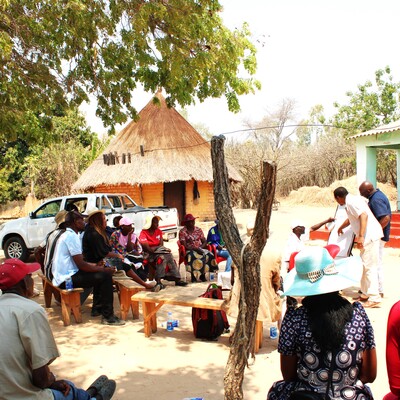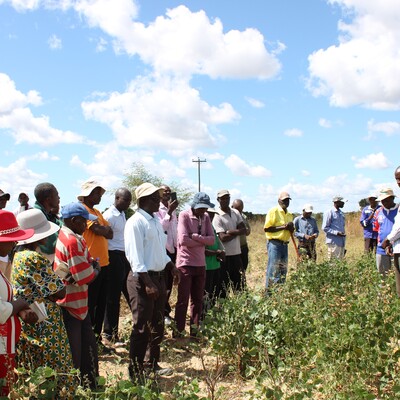

The Africa RISING end-of-program report: Highlights of a legacy of agricultural research in development for a sustainable future
In February 2023, a significant milestone was marked in Accra, Ghana, as the Africa RISING Program concluded its ambitious 12-year mission with a comprehensive close-out event. This program, which spanned the diverse landscapes of east and southern Africa, the Ethiopian Highlands, and west Africa, has notably enriched the lives of smallholder farmers, bolstered national agricultural research systems (NARS), and significantly advanced the science of systems research and sustainable intensification.
We are pleased to announce the release of the End-of-program report titled 'Strides in Sustainable Agricultural Intensification: Contributions of the Africa RISING Program (2011–2023).' This report encapsulates the program's transformative journey and its profound impact on sustainable agriculture. Through its five chapters, 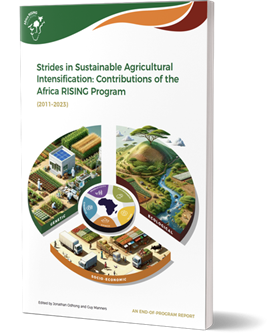 the report delves into the origins and vision of Africa RISING, showcases its significant achievements and impacts, and shares the invaluable lessons learned throughout its duration. It further explores the future prospects of sustainable intensification and farming systems science, culminating in a discussion on the enduring legacy of the program in terms of knowledge sharing and policy influence.
the report delves into the origins and vision of Africa RISING, showcases its significant achievements and impacts, and shares the invaluable lessons learned throughout its duration. It further explores the future prospects of sustainable intensification and farming systems science, culminating in a discussion on the enduring legacy of the program in terms of knowledge sharing and policy influence.
Key highlights from the report include:
• Sustainable intensification is possible: The Africa RISING program was pivotal in transforming agriculture through sustainable intensification technologies and practices designed to boost productivity, enhance natural resource management, and strengthen the resilience of smallholder farming systems. These practices have led to improved livelihoods for farm families, with notable benefits for women and children through enhanced food, nutrition, and income security.
• Innovations that made a difference: Throughout its duration, Africa RISING served as an innovation hub, identifying, and promoting crucial advances in agronomy, soil health, crop genetics, livestock management, mechanization, and food safety. These innovations were rigorously tested and adapted to ensure optimal results, providing direct benefits to the farmers.
• A new framework for measuring sustainability: A landmark achievement of the Africa RISING program was the development and piloting of the Sustainable Intensification Assessment Framework (SIAF). This tool has enabled the measurement and analysis of sustainability indicators across various dimensions, allowing for a comprehensive evaluation of the trade-offs and synergies associated with the implemented innovations.
• Empowering the next generation: Investing in capacity building, Africa RISING significantly enhanced the research capabilities of national researchers and institutions through both graduate and short-term courses, ensuring a legacy of knowledge and skills that will continue to benefit agricultural development.
• Scaling for wider impact: Beyond innovation, the program focused on ensuring the scalability of its successful practices by integrating them into government and partner NGO initiatives, thereby cementing their sustainability and long-term impact.
• Lessons for future endeavours: The success of Africa RISING can be attributed to its adaptability, strong partnerships, and a focus on local ownership and knowledge management. These elements ensured not only the success of the interventions but also their sustainability.
Looking ahead
The end-of-program report not only reflects on the achievements and the journey of Africa RISING but also on the future of sustainable intensification and farming systems science. It sets the stage for future initiatives that will build on the valuable insights and best practices developed through this program.
For more information and to download the full report, please visit: https://hdl.handle.net/10568/141589.
You may also like
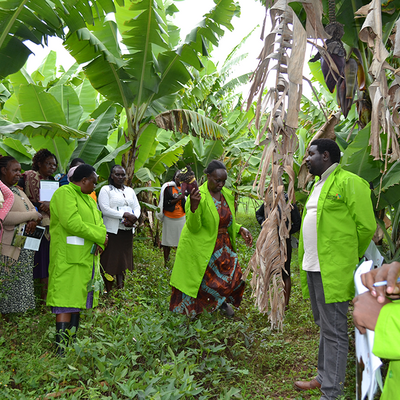
ILRI News
Pioneer adaptation farmers inspire adoption of climate-smart innovations in Bomet County, Kenya

Opinion and analysis
Sustainable manure management in Uganda requires an enabling policy and legal framework: a call to action!

Adaptation through diverse crop and livestock systems - The story of Edwin and Doreen, the adaptation pioneer farmers from Sotik
Related Publications

Sustainable Intensification in Crop-Livestock Systems: ILRI’s Approach and Experience
- Mekonnen, Kindu

Adaptation through diverse crop and livestock systems—The story of Edwin and Doreen, the adaptation pioneer farmers from Sotik, Kenya
- Onyango, Polycarp Otieno
- Kiptoo, Emmaculate

Factors associated with knowledge, attitudes, and practices of mixed crop-livestock farmers on Crimean Congo hemorrhagic fever (CCHF) and other zoonoses in Burkina Faso
- Ilboudo, Abdoul K.
- Dione, Michel M.
- Nijhof, A.M.
- Groschup, M.H.
- Traoré, O.
- Ilboudo, Guy S.
- Tarnagda, Z.
- Savadogo, M.
- Bett, Bernard K.





